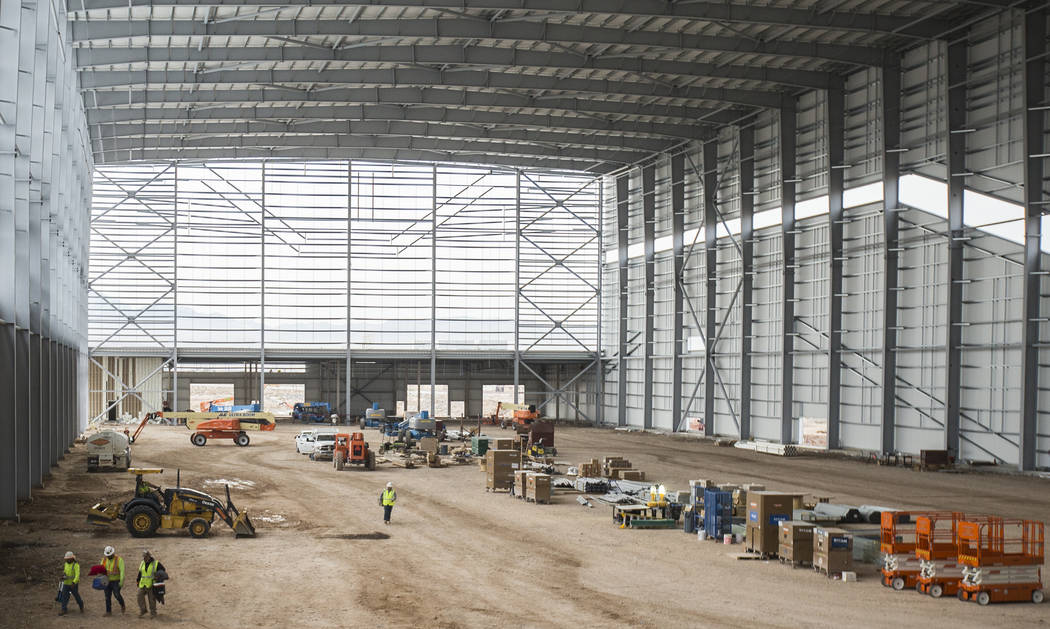Raiders sale, leaseback is latest such deal in Las Vegas Valley

When the Raiders sold their practice facility last week for more than $190 million and leased it back, it may have caught people by surprise.
The football team hasn’t finished building the complex, let alone played a game in Las Vegas, and it’s already flipping real estate here.
But these kinds of transactions — selling a building and renting it right back — are common, and Las Vegas has seen billions of dollars’ worth of such deals in the past several months alone.
The Raiders sold their under-construction Henderson headquarters and practice center for $191 million to Chicago-based Mesirow Financial and leased it back for 29 years, with seven 10-year extension options, filings with the Clark County recorder’s office show.
The sale closed Feb. 21. The filings do not show the NFL team’s annual rent.
Sale-leasebacks are found across several industries, from fast-food and fitness centers to casinos on the Strip. Sellers get a bundle of cash and lock in a long-term lease, and buyers collect a steady stream of rent.
At least, that’s the goal. If the seller runs into money problems or goes out of business altogether, the landlord’s rental income can dry up, especially if it can’t find a new tenant.
Doing the math
Understanding the risks is a big part of putting a sale-leaseback together, said Gino Sabatini, head of investments for New York real estate firm W. P. Carey.
“We are signing up for a very long-term deal” and relying on the tenant “to pay us our rent,” he said.
Still, Sabatini figures the deals are gaining popularity.
Sellers may want to cash in on their real estate to invest in a project, pay down debt, buy a company or issue a dividend to shareholders.
Meanwhile, low interest rates are making it cheaper for landlords to borrow money for a purchase. Sellers benefit too, said CBRE Group’s Guy Ponticiello, a Chicago broker who specializes in sale-leasebacks.
Given the lower financing costs, he said landlords can fetch better overall returns and, as a result, might be willing to charge lower rents.
Ponticiello also said it’s “very common” for projects to be sold and rented back before construction is finished.
Leaseback bonanza
It might seem obvious why the Raiders sold the Henderson facility, given the price they fetched, but the team isn’t saying. Raiders President Marc Badain declined to comment on the transaction this week.
However, the deal wasn’t unique in the valley, as Las Vegas saw a burst of casino leasebacks in recent months.
Caesars Entertainment Corp. sold the Rio to New York developer Eric Birnbaum for more than $516 million and leased it back for at least two years for $45 million in annual rent. MGM Resorts International sold the Bellagio to New York financial giant The Blackstone Group for around $4.2 billion in cash and leased it back for an initial annual rent of $245 million.
In a joint venture with MGM’s real estate investment trust, Blackstone also acquired MGM Grand and Mandalay Bay in a $4.6 billion deal and leased them back to MGM Resorts for an initial annual rent of $292 million combined.
Macquarie Group senior research associate Jordan Bender, who tracks casino REITs, noted a lot of companies want to pay down debt in case the economy sours.
Bender said casino REITs are relatively new and haven’t lived through a recession yet, and it’s unclear how their leasebacks would shake out if the economy falls apart again.
When buyers draw up a leaseback with a casino operator, one thing to look at is whether the tenant can “withstand 30 years of rent payments.”
“That’s the big question,” he said.
Contact Eli Segall at esegall@reviewjournal.com or 702-383-0342. Follow @eli_segall on Twitter.